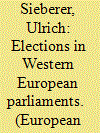| Srl | Item |
| 1 |
ID:
115026


|
|
|
|
|
| Publication |
2012.
|
| Summary/Abstract |
Under what conditions and to what extent do external officeholders in parliamentary democracies constrain the cabinet's freedom of action? The article argues that we must analyse both institutional powers and officeholders' incentives to use them to obtain an unbiased estimate of the expected constraint. It measures the incentives dimension via the selection method of external officeholders and develops an index to capture the likelihood that such officeholders hold preferences deviant from those of the cabinet. Analysing original data on four external constraint institutions in 25 European democracies, the article shows major variation in the incentives to constrain the cabinet across both offices and countries. Furthermore, it demonstrates that institutional powers and incentives for their use are empirically largely independent dimensions.
|
|
|
|
|
|
|
|
|
|
|
|
|
|
|
|
| 2 |
ID:
120510


|
|
|
|
|
| Publication |
2013.
|
| Summary/Abstract |
Parliaments often elect holders of important extra-parliamentary offices such as heads of state, constitutional judges, heads of audit institutions and ombudsmen. What drives the behaviour of parliamentary actors and the outcome of such elections? This article explains actor behaviour theoretically, drawing on spatial factors, principal-agent arguments about the importance of nonspatial candidate characteristics and signaling arguments about competitive considerations beyond the specific election. Empirically, it provides the first comparative analysis of such elections outside the United States Senate using original data on 100 elections for four external offices in 14 Western European parliaments. The findings show that spatial variables, nonspatial candidate characteristics and features of the competitive context systematically affect the election outcome. The article contributes to comparative parliamentary research in general by demonstrating how parliamentary activities, other than lawmaking, can be analysed using established theories and by showing that consensual aggregate outcomes can be explained within a competition-based rational choice model.
|
|
|
|
|
|
|
|
|
|
|
|
|
|
|
|